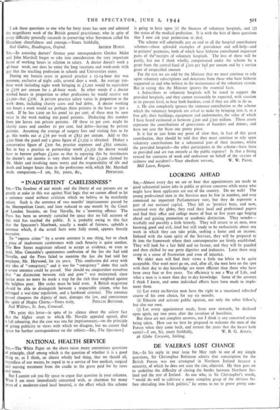NATIONAL HEALTH SERVICE
Sta,—The White Paper on the above raises many contentious questions of principle, chief among which is the question of whether it is a good thing or, as I think, an almost wholly bad thing, that we should all, regardless of our means, be roped in to a service of free medical, surgical and nursing treatment from the cradle to the grave paid for by rates and taxes.
But I cannot ask you far space to argue that question in your columns. What I am more immediately concerned with, as chairman for many years of a moderate-sized local hospital, is the effect which this scheme
is going to have upon (1) the finances of voluntary hospitals, and (2) the status of the medical profession. It is with the first of these questions that I now ask your permission to deal.
The scheme will admittedly put an end to all the hospital contributory schemes—those splendid examples of providence and self-help—and to patients' payments, both of which have hitherto contributed important parts of the receipts of voluntary hospitals. The loss of these will be partly, but not I think wholly, compensated under the scheme by a grant from the central fund of Liao per bid per annum and by a service grant of unspecified amount.
For the rest we are told by the Minister that we must continue to rely upon voluntary subscriptions and donations from those who have hitherto supported us and who believe in the maintenance of the voluntary system. But in saying this the Minister ignores the essential facts.
1. Subscribers to voluntary hospitals will be taxed to support the provided hospitals, and they cannot reasonably be expected, with taxation at its present level, to bear both burdens, even if they are able to do so.
2. He also completely ignores the immense contribution to the scheme which the voluntary hospitals are asked to make by bringing into it, as a free gift, their buildings, equipment and endowments, the value of which I have heard estimated at between £200 and £30o million. These assets represent the contributions of generations of founders and donors, and have not cost the State one penny piece.
Is it fair or just from any point of view that, in face of this great contribution, they should be told that they must continue to rely upon voluntary contributions for a substantial part of their incomes, whilst the provided hospitals—the other participants in the scheme—have been so provided and are run entirely at the public expense? Is that a fitting reward for centuries of work and endeavour on behalf of the victims of sickness• and accident?—Your obedient servant, W. W. PAINE. Mill Lawn, Reigate.


























 Previous page
Previous page